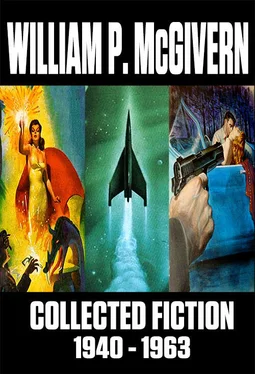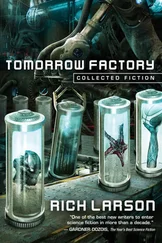Уильям Макгиверн - Collected Fiction - 1940-1963
Здесь есть возможность читать онлайн «Уильям Макгиверн - Collected Fiction - 1940-1963» весь текст электронной книги совершенно бесплатно (целиком полную версию без сокращений). В некоторых случаях можно слушать аудио, скачать через торрент в формате fb2 и присутствует краткое содержание. Год выпуска: 2014, Издательство: Jerry eBooks, Жанр: Ужасы и Мистика, Фантастика и фэнтези, Детектив, Прочие приключения, на английском языке. Описание произведения, (предисловие) а так же отзывы посетителей доступны на портале библиотеки ЛибКат.
- Название:Collected Fiction: 1940-1963
- Автор:
- Издательство:Jerry eBooks
- Жанр:
- Год:2014
- ISBN:нет данных
- Рейтинг книги:3 / 5. Голосов: 1
-
Избранное:Добавить в избранное
- Отзывы:
-
Ваша оценка:
- 60
- 1
- 2
- 3
- 4
- 5
Collected Fiction: 1940-1963: краткое содержание, описание и аннотация
Предлагаем к чтению аннотацию, описание, краткое содержание или предисловие (зависит от того, что написал сам автор книги «Collected Fiction: 1940-1963»). Если вы не нашли необходимую информацию о книге — напишите в комментариях, мы постараемся отыскать её.
Collected Fiction: 1940-1963 — читать онлайн бесплатно полную книгу (весь текст) целиком
Ниже представлен текст книги, разбитый по страницам. Система сохранения места последней прочитанной страницы, позволяет с удобством читать онлайн бесплатно книгу «Collected Fiction: 1940-1963», без необходимости каждый раз заново искать на чём Вы остановились. Поставьте закладку, и сможете в любой момент перейти на страницу, на которой закончили чтение.
Интервал:
Закладка:
In spite of his panicky terror, Oscar experienced a jealous twinge as he goggled at the ruddy features and healthy bulk of Lester Mercer.
This was the man responsible for Ann’s angry words. Ann had become completely captivated by Mercer’s dominating bluster, his executive belligerence. Ann thought he was wonderful.
Lester Mercer, it may be said, quite agreed with her.
On top of that Mercer had been taking Ann to dinner for the past month, filling her head with the idea that she was wasting herself on an insignificant little twerp like Oscar Doolittle.
It was a situation to prompt an ordinary person to swift, drastic action. But Oscar Doolittle was far from being an ordinary person.
“I’m sorry,” he stuttered breathlessly. “I was just clearing my throat. No offense, I trust. I’ll be getting on to work.” He started away but Mercer’s voice jerked him around again.
“Not so fast, Doolittle,” Mercer snapped. “I can’t say that I’m satisfied with the way you’ve been handling your work. It may be necessary to make some changes, relieve you of some of your responsibility. I’ll see you about it later.”
He flicked a glance at his expensive wrist-watch.
“I have to discuss a few details with Miss Meade at the present. I’ll see you later.”
He turned and strode away, head out-thrust, in the best executive tradition.
Oscar turned sadly and tottered toward his little cubicle, his mind reeling under the double-barreled kick in the pants he had received. His invention a flop. His girl gone — the work he had done for twelve years snatched away from him. It was too much.
There was a strange buzzing in Oscar’s ears and his head floated with a peculiar lightness, as he reeled past the long, barred row of tellers’ windows. His whole world had gone smash, turned topsy-turvy. Nothing, he was sure, could ever shock him again.
In that he was tragically mistaken.
For as the strange buzzing noise hummed louder in his ears, things were beginning to happen, that promised to make the preceding events as commonplace and prosaic as the rest of Oscar Doolittle’s entire existence.
Unaware of this, Oscar slouched dolefully along, until he reached the full-length mirror that glittered magnificently from one of the imposing columns that supported the dome-like ceiling of the Midland State Bank.
It was Oscar’s custom to pause here, adjust his tie and comb his hair, before he entered his tiny office for the day. And in spite of his benumbed, dazed condition, the habit of fourteen years was too strong to be resisted. Automatically, he moved closer, fumbling for his comb.
He was prepared to see reflected in the mirror his small, squinting, sandy-haired person, staring back at him. To his amazement, he saw nothing of the sort!
Instead, the mirror reflected the wide lobby of the bank, bustling clients and employees and the revolving doors that were spinning continually as people surged in and out of the building.
The mirror reflected everything in front of it, everything but Oscar Doolittle.
Stunned, Oscar crowded closer to the mirror, until he was a scant six inches from its gleaming surface.
Still he was not reflected. Reason tottered.
“What’s happened?” Oscar cried frantically. “What’s the matter?”
With trembling fingers he felt the surface of the smooth glass. He could see the moist impression where his hands touched the glass, feel its cool, smooth surface under his fingers.
Suddenly, with terrifying swiftness, he realized that at the spot where his hands touched the mirror, there was nothing. Nothing at all. No hands. No reflection.
He jerked his hands in front of his incredulous eyes, pressed them frantically into his face. His mind wavered giddily on the brink of insanity. For while he could feel his hands on his face, he couldn’t see them.
He closed his eyes tightly and a despairing moan forced itself through his teeth. Then he opened his eyes and looked down at his feet.
His glassy orbs encountered the small squares of marble flooring. His shiny shoes, baggy brown pants were gone. His incredulous eyes traveled up his vanished nether extremities, widening in horror as they saw nothing but empty space where his body should have been.
Oscar Doolittle had become invisible! [1] While it would hardly seem possible that vanishing cream could make anyone disappear, it is conceivable that Oscar’s special secret formula, which he mixed with the ordinary vanishing cream, contained an infiltrating property which was absorbed through his skin. It reacted by neutralizing skin, hair, eye and lip pigmentation and coloring, in a cycle of set periods. Therefore at definite intervals, Oscar became “invisible” — because changes within his system, influenced by the special formula, made him colorless, while at the same time impairing none of his faculties.
“My God,” he groaned, “what’s happened to me? Where am I?”
A stout bank official who was hurrying past, paused and looked bewilderedly.
“Thought I heard something,” he muttered. “Must be my imagination.”
He turned and moved away, shaking his head and mumbling to himself.
Oscar stared after him, his mind tossing about on a raging sea of despair and chaos.
“He didn’t see me. I’m not just insane, this has actually happened,” he told himself incredulously.
A rumbling noise grew in volume behind him. He wheeled to face a heavy refuse truck that was bearing down on him. Under the impetus of a beefy maintenance laborer it covered the distance between Oscar swiftly, menacingly.
With a breathless squawk, he sprang from the path of the heavy refuse truck, hugging the wall as it rattled past him.
Now that he was invisible, he wasn’t safe. Others couldn’t see him.
Panting and harried, Oscar fled along the corridor, like a hunted thing, his breath searing his lungs. His way was finally checked by the back of a large, thick-set young man, who was built like a wrestler. Driven by a frantic impulse to flee, Oscar ducked around him, lunged ahead.
His shoulder collided with a soft, yielding substance and a piercing scream split the air, shattering the tranquillity of the Midland State Bank.
Recovering himself, Oscar stared horror-stricken at the beautiful, angry features of the young woman he had knocked to the floor. Her escort, a tall, muscular-looking fellow, wheeled about and shook a large fist under the surprised nose of the thickset young man with the wrestler-like build.
“What’s the idea,” he shouted belligerently, “of barging around knocking people over? I ought to bust you in the jaw.”
“Listen, chum,” the burly young man snapped, “nobody knocked your dame off her pins. She stumbled and fell, that’s all. If you still feel like busting me in the jaw, why don’tcha try it!”
An instant later a glorious free-for-all was raging in the normally peaceful domains of the Midland State Bank.
Shouts and catcalls filled the air as the quickly gathering crowd pressed forward hungrily to witness the spilling gore.
Women screamed at the top of their voices. Babies wailed in a shrill, ever-increasing crescendo. Terrified, completely bereft of reason, Oscar crowded back against the wall, staring wildly at the eruption he had caused.
A police whistle shrilled through the growing clamor. Forcing their way through the crowd, Oscar saw the grimly efficient, blue-clad bank guards. In their hands were long, vicious-looking night sticks.
“Who started this?” one of them roared. “I’ll break the head of the man that started this!”
Oscar trembled guiltily. With pounding heart, he slipped and wriggled his invisible body through the crowd until he reached open space.
Читать дальшеИнтервал:
Закладка:
Похожие книги на «Collected Fiction: 1940-1963»
Представляем Вашему вниманию похожие книги на «Collected Fiction: 1940-1963» списком для выбора. Мы отобрали схожую по названию и смыслу литературу в надежде предоставить читателям больше вариантов отыскать новые, интересные, ещё непрочитанные произведения.
Обсуждение, отзывы о книге «Collected Fiction: 1940-1963» и просто собственные мнения читателей. Оставьте ваши комментарии, напишите, что Вы думаете о произведении, его смысле или главных героях. Укажите что конкретно понравилось, а что нет, и почему Вы так считаете.

![Уильям Макгиверн - Завтра опять неизвестность [английский и русский параллельные тексты]](/books/35168/uilyam-makgivern-zavtra-opyat-neizvestnost-angli-thumb.webp)









